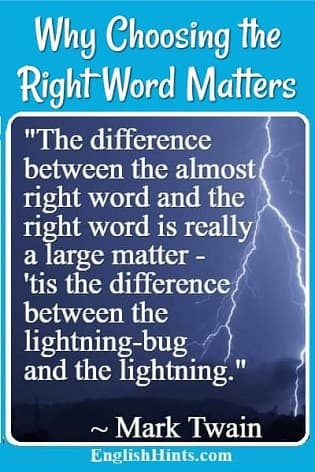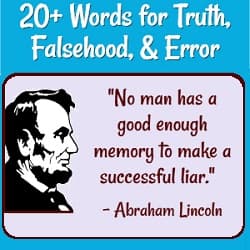Why the Right Word Matters
The right word can make your message clear and compelling. Over fifty years later, people are still moved by the dream Martin Luther King Jr. shared. He hoped that one day his children would “not be judged by the color of their skin but by the content of their character.”
Think how much impact he would have lost if he had asked that they be judged “not by the color of their skin but by the quality of their competence.”
(He could have spoken instead about “the value of their contribution” or “the appeal of their personality.”) Character goes deeper—to the core values a person lives by.
Choosing the right word can help your readers or listeners “see” what you see. It lets them understand why what you’re telling them matters.
A different word might not carry the same weight or feeling and could fail to communicate your message.
It’s important to understand the connotations of the words you use to express your core message. That’s why great writers struggle over their word choice. Words have power, and the background of each word contributes to the impact it has.
 lightning bugs (or "fireflies")
lightning bugs (or "fireflies")In the Declaration of Independence, Thomas Jefferson reworded Locke’s influential idea about the rights to “life, liberty, and property” to “life, liberty, and the pursuit of happiness." Those words are still part of the foundation of American thinking about rights.
When you have several words to choose from, it’s worth looking them up if you’re not sure of their connotations. (Connotations are the emotional tone and background of a word—the levels of meaning it has developed over the years.)
Some similar words may arouse very different responses from your readers. You need to recognize words that carry strong emotional undertones along with their basic meaning.
Most of this page will look at
• some of the ways similar words can differ, and guidelines for choosing the most appropriate ones
• examples of (sometimes unexpected) word connotations (including the connotation of different ways to say 'said'-- and describe your feeling about what the speaker said)
• some pages on EnglishHints that compare words for specific purposes
• ways to learn word connotations and to get help choosing the right word for your purpose
Words with Similar Meanings May Have Very Different Effects
Similar words may vary in their formality. Words with old English roots tend to be less formal. They work well for everyday use but might not be exact enough for some formal writing.
French-based words & especially words with Latin or Greek roots are more formal. (See an excellent TED Ed video on French vs Old English near the top of the Word Origins page.)
Some words like slang (or “swear words”—especially words you often see written with asterisks replacing some letters!) are only appropriate in certain settings. If in doubt, don’t—especially at work or in academic settings.
Words with similar definitions may also vary in their emotional charge. (See the connotation examples below.) Some may be positive, others neutral, and still others extremely negative.
Compare relaxed, easy-going, lazy, and shiftless, or prudent, careful, cautious, and timid. Then look at their near-opposites: decisive, bold, assertive, forceful, aggressive, demanding, or pushy. (In all three sets of words I’ve started with the most positive synonym and moved to more negative words on the right.)
Similar words may also vary in their intensity. Planning and intending are more serious than just wanting to do something. Determination is still more intense. Bad experiences can go from unpleasant or uncomfortable to miserable, dreadful, or horrendous.
Often one or two synonyms may work equally well for the thought you're sharing. It's just important to be aware of possible differences in formality, intensity, or connotations. They may make a word just right for your purpose-- or a very poor choice.
Examples of Word Connotations
While I was working on this page, I read a Smithsonian article on word use for events of the the American Civil War era. Some scholars “suggest the Compromise of 1850 be more accurately referred to as an Appeasement. The latter word precisely reflects the sway that Southern slaveholders held in the bargain.”
Compromise implies both sides yielding something to reach an agreement. Appeasement has much more negative connotations. It describes a cowardly surrender rather than fighting for one’s principles.
‘Argue,’ ‘argument,’ & ‘argumentative’ show the different connotations words can have depending on the context. An argument is not always a hostile discussion. (Consider the expressions “a persuasive argument” or “an eloquent argument.” Both suggest winning over the audience.)
An argument is often the defense of an idea or plan with the hope of persuading others to see the value of it. The verb ‘argue’ can also refer to a neutral discussion. (“The mayor argued for a new city hall.”) However, the adjective has only unpleasant connotations. Argumentative people constantly disagree with others and insist on their own way.
Since writing this page I found an article by Inc. making an even more forceful argument about the importance of choosing the right word for your purpose. It explains the crucial, though seemingly small, differences between the words ‘argue,’ persuade’, and ‘convince.’ It suggests that understanding those differences can help you “get what you want in business and life.”
Different Ways to Say "Said"
This infographic on 476 Ways to Avoid Saying “Said” shows how many ways English can express similar thoughts. Look at the connotations of words in the second section of that page alone.
Some describe frivolous speech: babbled, blabbered, nattered, prattled, rattled on, & more. Others are fault-finding: harped, ranted, and sometimes lectured. Some messages lack focus: the speakers digressed, rambled, or trailed off. Others gave formal and boring speeches-- they intoned, lectured, or preached.
That section also listed many words with neutral connotations. These refer to the middle and end of a speech: people resumed, continued, went on, & then concluded, ended, or finished.
When you need just the right word for a sharp, clever answer, you might use ‘retorted.’
An unfriendly opponent might bait, mock, provoke, or taunt his adversary. These are all ways of insulting him. Their intention is often to make him lose control and say or do something foolish.
Here’s another example—a discussion of the difference between responding and reacting, which we think of as close synonyms. The article suggests that a reaction is immediate, emotional, and almost unconscious. To respond is to take time to think about what you’ve heard. A thoughtful response is more likely to resolve problems and improve relationships than an automatic, “knee-jerk” reaction.
For still more examples of the differences in connotations between synonyms, see the two sections below. The better you understand the connotations of each word you’re considering, the easier it is to choose the right word for your purpose.
Pages Comparing Related Words
Several pages on EnglishHints discuss differences in connotation and word use for specific subjects. See
Explanation & practice with synonyms for truth, mistakes, & lying.
An explanation of words in favor or opposed to political ideas or parties, verbs for varying levels of disagreement or compromise, political idioms, & more
Differences in meaning for various words for working together, with practice
Social Change Vocabulary gives examples of several kinds of large or small changes, changes for better or worse, & more.
Personality Vocabulary, Vocabulary for Violence, or War Vocabulary also discuss variations in meaning for related words.
Finding the Right Words for Your Needs
So, how do you find the right words in English at the moment you need them?
The best (though long-term) way to learn English words and their connotations is to read and listen to a variety of English sources. That's especially important in the areas in which you most often speak or write.
Even if you do that, you will sometimes not be able to think of the exact expression you want at the time you need it. If you’re writing, you can look up a related word and find its synonyms in a good dictionary or thesaurus. (Be sure to double-check the meaning and connotations of any word you’re not quite sure about.)
If you’re talking to someone, you may have to use the best word that comes to mind, and then look up others later. In some cases, you can follow up with an email afterward to clarify your message. Don’t let it worry you too much!
Get Free English Vocabulary and Connotations Help Each Month
I send out my English Detective newsletter the first (and sometimes third) Tuesday every month with suggestions for Great English reading or listening materials, as well as occasional vocabulary or connotations practice.
Right now I'm also offering a free connotations worksheet with a brief explanation, more examples, and two practice exercises (deciding some of the connotation of these words in sentences, and filling in the blanks of a short essay with various forms of the words critical, criticism, and criticize). You can sign up below if it sounds interesting.
(Of course, I never share your email address with anyone-- and if you don't find it helpful, you can unsubscribe at any time.)
Home > Advanced Communication Skills in English > Why the Right Word Matters
Didn't find what you
needed? Explain what you want in the search box below.
(For example, cognates, past tense practice, or 'get along with.') Click to see the related pages on EnglishHints.
| site search by freefind | advanced |









